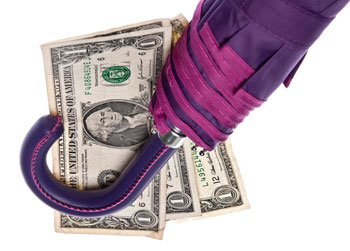Posted by

How Much Cash Do I Need for a Rainy Day?
If the economic collapse taught us anything, it's that nothing is guaranteed in life. The same could go for the dot-com crash in the early 2000's. Time and time again, many people are left with nothing during sudden financial downfall. It's not just the huge problems that can hurt pockets, though. Even something as simple as a broken air conditioner in a new warehouse can be detrimental to a business.
The only guarantee in life (other than death and taxes, of course) is that things change, and not always for the better. When it comes to saving money just in case, understanding life's instability will help you prepare for the worst. Whether your business is new, or you're a veteran in your field, you need to have financial safety measures in place for rough times.
The best way to start thinking about your business's rainy day fund is with a clear definition:
A rainy day fund is a reserved amount of money to be used in times when regular income is disrupted or decreased in order for typical operations to continue. It can help in a variety of situations where funds are immediately necessary and you don't have them available.
With that in mind, how much money is enough in case of an emergency for your business? At least three months worth of income (six if you're able) can carry you through a dry season. The more you save, the better, so never put limits on your savings. It's not always feasible to have three or more months of income saved, especially for new small businesses. Having a backup plan is financially responsible. In cases when your expenses exceed your savings, factoring can provide an alternate source of help. Utilizing factoring services can carry you through many tough financial situations (and get that air conditioner up and running again).
Knowing that your company has the ability to survive the tough times is one of the most important aspects to a successful, long-lasting business. There are other methods, including:
- Proper bookkeeping
- Storing accurate records in a safe place
- Knowing trends for your industry (slow seasons, expenses, etc)
- Having a financial plan b for rough times
While it can seem like a lot of work, saving and keeping your finances in order will save you a lot of headache later. Whenever possible, make sure you've set up a great safety net for your efforts.
 Catamount has always been there for us and has been very instrumental in helping us succeed.
Catamount has always been there for us and has been very instrumental in helping us succeed. 
 Without Catamount we would not be where we are today...period. They have been a tremendous help and are very supportive!
Without Catamount we would not be where we are today...period. They have been a tremendous help and are very supportive! 
 When we needed help Catamount stood up to the plate for us. Their service is outstanding...great people to work with!
When we needed help Catamount stood up to the plate for us. Their service is outstanding...great people to work with! 





